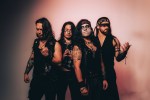“Fuck it, we’re taking the metro,” says Chilean singer-songwriter Javiera Electra, clasping her broken guitar case and rushing into the chilly Santiago night. It’s August, and the unyielding winter rain has made securing an Uber impossible. But the rising art-pop star is dropping a new song that evening, and she’s determined to promote it at both her back-to-back gigs. She’s just wrapped a performance at the launch of the music podcast Reverberancias, and now we sprint from the train and down several blocks, arriving at the glitzy press event for the feminist music festival, Ruidosa. She narrowly makes the call time, and following a quick makeup retouch, Electra joins Francisca Valenzuela on the stage for an exuberant duet of her pop-rock classic, “Muérdete La Lengua,” closing the fête on a literal high note.
Two months later, the 27-year-old supernova is sitting in her living room with her dog, Kira. She wears a T-shirt emblazoned with the face of Chilean ex-president and socialist martyr Salvador Allende, and her shaved hairline reveals a jagged tattoo evocative of a crown of thorns—a conservative nightmare incarnate. She’s still exhausted from performing at Ruidosa over the weekend, where she opened the Sunday mainstage with songs from her newly released debut album, Helíade. The crowd danced and sang along to an eclectic musical palette ranging from prog-rock and electronic distortion to a panoply of Latin American rhythms, including cumbia, bolero, and Chilean cueca. But don’t be fooled by the catchy tunes; Electra’s harrowing lyricism and larger-than-life stage persona metabolize the trials and loss of a young trans artist carving her unique path in a violent world.
“Shortly after my performance [at Ruidosa], I checked my phone and saw lots of transphobic comments online, and that made me really sad,” Electra tells Remezla, remembering the bittersweet afternoon and how she sought solace from the only other trans woman on the bill. “I had the idea to speak with Villano Antillano and waited outside her dressing room. She was so kind, and we spoke about Luisa Almaguer and Arca, and of how few of us work in this industry. Not to mention trans men. But she said to me, ‘Pick up the flag whenever you need it. Your identity is yours, and no one can force you to use it or commercialize it.’ It was such a relief to let go of the weight [of representation], which is why building community is so important.”
Electra has known hustle her entire life. She was born in the city of Rancagua, an hour south of Santiago’s urban sprawl, and grew up bouncing around Chile’s central valley in towns like San Fernando, Rengo, and Curicó.” As a kid, she picked and sold produce with her godmother’s family, and even bought her first CD—a copy of Valenzuela’s Buen Soldado—with money earned from berries and loquats. The market nourished her musical tastes with rancheras and weepy “cumbia cebollera,” while ridealongs with her father, who worked as a radio host, exposed her to the pop melodies of Julio Iglesias. Though she’s been lauded in recent years for incorporating folksy cueca and décimas into avant-garde singles such as “Cuarta pared” and “Ambar,” Electra insists these hybrids are rooted in class and circumstance rather than roots investigations.

“I’m proud of my childhood working with family at the markets, but there was a time when I was embarrassed and reneged from all that,” she says. “Eventually, me homosexualizé, and I discovered Britney [Spears], Madonna, Kylie [Minogue], Miley [Cyrus], Selena Gomez… I actually got my start producing pop, but I pivoted to singer-songwriter when my computer was stolen. Everyone thinks I’m this child of Violeta Parra, but I discovered her when I was much older.”
Electra’s small town life grew stifling, so she spread her wings in Santiago and Valparaíso, bohemian enclaves that exposed her to the experiences of trans, travesti, and dissident people, informing the class politics of her own evolving identity. She busked on the Valparaíso metro singing Alex Anwandter’s anthemic “Manifiesto,” and cultivated a small following at El Ollón de las Putas, a community kitchen serving the port city’s sex workers. One of her earliest champions was the singer Roma Gallegos, whom she met at the casting for a TV talent show. Although neither was selected, they bonded over the glossy pop of Denise Rosenthal. But during a trip to Buenos Aires, Electra received the news that Gallegos had taken her own life, a devastating blow that later focalized her mission.
“I promised myself to work for our dream,” Electra says. “We used to sing Mon Laferte all the time, during the Vol. 1 era. Now, whenever I hear Mon sing, I’m inundated with [Roma’s] energy. I see her in the street; in crowds. Other friends have said the same, so Roma has become an omnipresent angel for many of us.”

Helíade is dedicated to the memory of Gallegos, with Electra rooting her metaphors in the Greek myth of the Heliades, daughters of the sun god Helios, who mourn the tragic death of their brother Phaëton with flaming tears of amber. Like so, the astonishing “Lágrima del Sol” builds from an acoustic funeral dirge to rapturous Andean cumbia right out of Gepe’s folk-pop playbook, with a devastating hook of “No te apagues” that pleads for beloved voices never to be extinguished. Electra composed the post-rock hurricane of “Helíades; Roma, Mar y Sol” for a play she wrote about her friend several years ago. And in separate interludes, the trans poets Claudia Rodríguez and Susy Shock deliver spoken word eulogies that underscore collective grief and resilience. However, Electra reveals that her Phaëton is actually her brother, for whom she wrote the alt-rock wailer “Sangre Oliva,” depicting the limbo of their estranged relationship as being “muerto en vida.”
Helíade has received an overwhelmingly positive reception, and Electra has embarked on a tour through Spain and Latin America. She recorded a KEXP live session during the BIME conference in Bilbao, with social media clips showing the fearless performer kicking and whipping her hair from atop a church altar. Electra also teases that her next album is well underway, departing from the headiness of her debut and channeling the art-rock mystique of PJ Harvey and Imogen Heap. Regardless, it’s clear her mix of raw honesty and cheeky sense of humor is transcending apprehensions of genre, market, or identity, and she’s adamant that hard work will continue to bear fruit.
“It’s the work and the music that get people talking,” reflects Electra, remembering a conversation she had with the pop singer Cami, back at Ruidosa. “Yes, it’s complicated carving your spot as a trans artist, but if the work is good, and people value the music and the show, they’ll give you a chance. This is a capitalist industry. It’s about selling, so the more shows I book and the more festivals I play, the more people will come to know and accept me. I’m fighting for my place in this business, and I’m just getting started.”

Helíade is out now.
